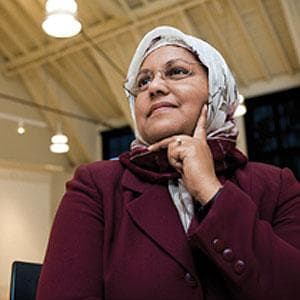Advertisement
9/11 Stories: A Hijab And Fatigues
WBUR is remembering Sept. 11 through the stories of men and women from around Massachusetts whose lives were touched that day — those who lost loved ones, those who responded and those whose lives were affected in more unexpected ways.
Two segments of the public may have felt Sept.11's effect most profoundly: Muslims and soldiers. Shareda Hosein is a Muslim soldier. She grew up in Boston, and joined the service out of high school in 1979. Being a Muslim in the U.S. military was always a balancing act, even before 9/11.
Click to hear Shareda tell her story, or read it below.

I’d say the biggest part was wearing the hijab 28 days out of the month and then those two days when I did my reserve duty, having to take my hijab off. I felt a sense of nakedness, there was this conflict: should I leave the military, should I stay in the military?
It was in February 2001, I read an article in The Boston Globe and it said, the article was talking about chaplains in the military and the endorser Qaseem Uqdah, he said, I would love for a female to become a chaplain in the military because it would make such a world of difference for mostly the spouses of the military personnel, who are predominantly male.
And when I read that article I felt, this is it. I’m allowed to bring my Muslim life and my military life together in one profession.
--
On Sept. 11, 2001, I was at seminary, it was my second day. It was around 10 a.m., we were already in session, in class for about an hour, and this one woman got the message on her cellphone that her sister was in New York and did we hear what happened and she was very distraught.
And when we finally got clarity of what actually happened, I would say it was the first time that I experienced fear — as an immigrant, as a Muslim and as a military member.
When I wore my uniform I got, "Thank you very much for serving your country," I got great smiles. And when I wore my other uniform, my head covering, it was like, "Why are you here? Your people caused this harm on us." And so, whichever uniform I was wearing was a totally different experience.
"When I wore my uniform I got, 'Thank you very much for serving your country.' And when I wore my my head covering, it was like, 'Why are you here?'"
Shareda Hosein
My security officer came up to me and he said, "Shareda, I don’t know if you’ve thought about this but since you’re in the military, maybe your Muslim community may not trust you. And because the Muslims are the ones that attacked the U.S., maybe there are people in the military [who] may not trust you."
So that immediately got me to thinking that I need to help educate people around me. And so I did conduct a few classes for my personnel so they could understand the basics about Islam.
--
I needed to complete at least two years of seminary before I applied to join the ranks of the chaplaincy. 2003 I put in my application. I was told that I couldn’t because within Islam, women are allowed to lead prayer to women only, but not to both men and women. And the military felt since I couldn’t lead the prayer to both men and women then I’m not fulfilling the duties of how they see a chaplain’s duties should be. So I was not allowed to be accessioned into the ranks of chaplaincy.
A note: Shareda feels that the military fundamentally misunderstands Islamic rituals. Any Muslim man can lead prayer, he doesn’t have to be clergy. So anyone in the congregation could serve that role and Shareda says she could focus on being a spiritual adviser to the soldiers and their spouses.
When they told me that I couldn’t become a chaplain I was very angry. The gender issue, I’ve been fighting that battle my entire life, and I feel like I’m still fighting that gender battle.
I thought long and hard: do I want to sue the government? Because this would be the only way there would be a possibility, and I could lose. And I thought, well I would hate to go into a profession of advocating for people and dealing with spiritual issues with a lawsuit to the government because then it could become a media frenzy and I would be known as the first Muslim woman that fought to be a chaplain, rather than a chaplain that wanted to serve.
And that was one of the leading factors for me not to sue the government. However, what I am committed to is finding a female to break the barrier and allowing her to be the first Muslim chaplain.
Since our conversation with Shareda, she may have found a woman willing to take up the struggle. Soldier Natacha Castelly says she wants to be a Muslim chaplain. And Shareda says she believes the climate in the Army may be more welcoming now.
This program aired on September 6, 2011. The audio for this program is not available.